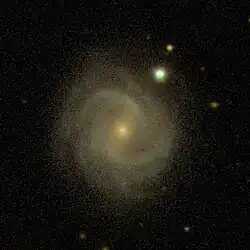| NGC 2503 | |
|---|---|
 Spiral galaxy NGC 2503 | |
| Observation data (J2000 epoch) | |
| Constellation | Cancer |
| Right ascension | 8h 00m 36.7s[1] |
| Declination | 22° 24′ 00″[1] |
| Redshift | 0.018366/5506 km/s[1] |
| Distance | 254,300,000 ly |
| Apparent magnitude (V) | 14.4 [1] |
| Characteristics | |
| Type | SAB(rs)bc[1] |
| Size | ~87,630 ly (estimated)[1] |
| Apparent size (V) | 1.07 × 0.98 [1] |
| Other designations | |
| CGCG 118-41, KARA 222, MCG 4-19-19, PGC 22453, UGC 4158 [1] | |
NGC 2503 is an isolated spiral galaxy[2] approximately 254 million light-years away[3] in the constellation Cancer.[4] The galaxy was discovered on February 17, 1865 by astronomer Albert Marth.[5][6]
See also
References
- 1 2 3 4 5 6 7 8 "NASA/IPAC Extragalactic Database". Results for NGC 2503. Retrieved 2017-08-16.
- ↑ "Detailed Object Classifications". ned.ipac.caltech.edu. Retrieved 2017-08-18.
- ↑ "Your NED Search Results". ned.ipac.caltech.edu. Retrieved 2017-08-18.
- ↑ Rojas, Sebastián García. "Galaxy NGC 2503 - Galaxy in Cancer Constellation · Deep Sky Objects Browser". DSO Browser. Archived from the original on 2017-08-17. Retrieved 2017-08-18.
- ↑ NGCIC
- ↑ "New General Catalog Objects: NGC 2500 - 2549". cseligman.com. Retrieved 2017-08-18.
External links
 Media related to NGC 2503 at Wikimedia Commons
Media related to NGC 2503 at Wikimedia Commons- seds.org
- SIMBAD astronomical database
- NGC 2503 on WikiSky: DSS2, SDSS, GALEX, IRAS, Hydrogen α, X-Ray, Astrophoto, Sky Map, Articles and images
This article is issued from Wikipedia. The text is licensed under Creative Commons - Attribution - Sharealike. Additional terms may apply for the media files.